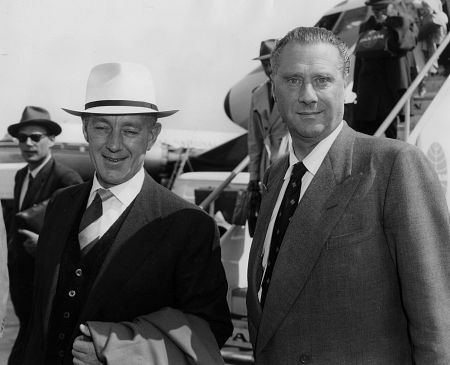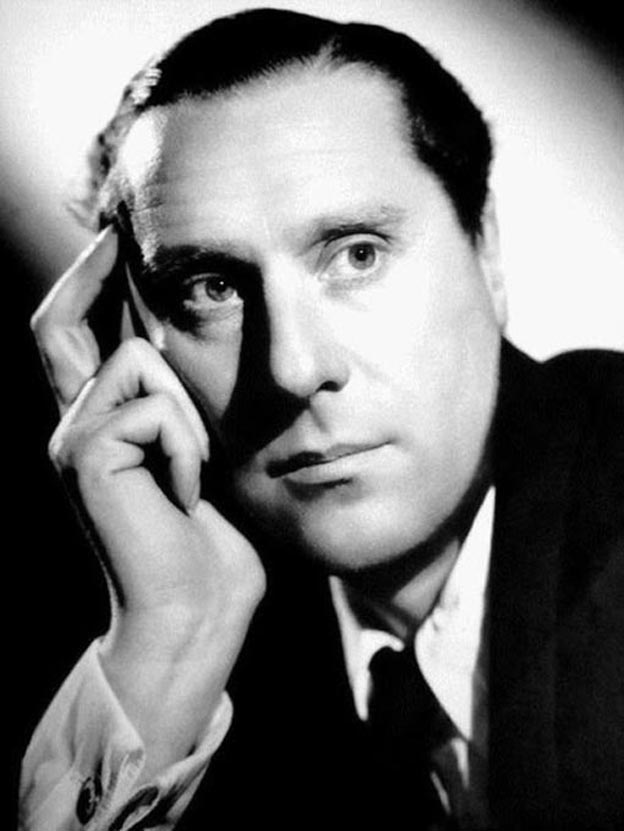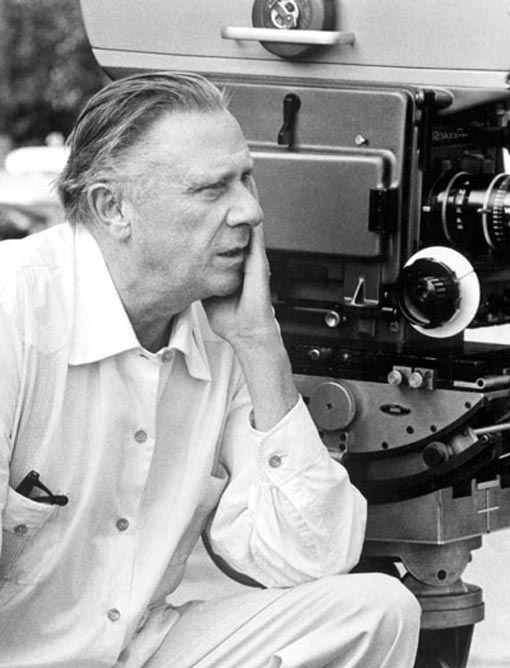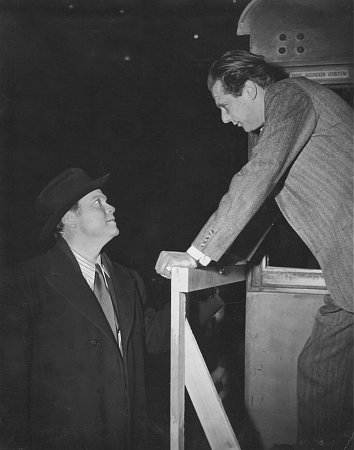
Carol Reed
Birthday: 30 December 1906, Putney, London, England, UK
Height: 188 cm
Carol Reed was the second son of stage actor, dramatics teacher and impresario founder of the Royal School of Dramatic Arts Sir Herbert Beerbohm Tree. Reed was one of Tree's six illegitimate chil ...Show More

[on moving from being an assistant director to director] I was indefinite and indecisive. I thought Show more
[on moving from being an assistant director to director] I was indefinite and indecisive. I thought I had picked up a lot about cutting and camera angles, but now, when I had to make all the decisions myself and was not just mentally approving or criticizing what somebody else decided, I was pretty well lost. Fortunately I realized that this was the only way to learn--by making mistakes. Hide
After you've been shooting awhile and are looking at your footage as you go, you begin to see the pi Show more
After you've been shooting awhile and are looking at your footage as you go, you begin to see the picture taking shape, establishing a rhythym of it's own. Things begin to fall into place of themselves. That's when you begin to feel the picture's natural pace and you develop it. You can then work with the actors and mould and shape it. Hide
There is nothing worse than a film that is directed by someone who has little or no knowledge of the Show more
There is nothing worse than a film that is directed by someone who has little or no knowledge of the habits or ways of the country concerned in the picture. For instance, I would never make a film with an American college background, I would be bound to make too many mistakes. Hide
[on the task of directing Oliver! (1968)] This is [Charles Dickens]. There are problems of a special Show more
[on the task of directing Oliver! (1968)] This is [Charles Dickens]. There are problems of a special kind. You say to yourself: "Fagin as a character would never dream of singing anything, nor, perhaps, would the Artful Dodger or Bill Sikes". They would probably get a laugh. The only way we could do justice to these characters as well as we knew how, and you can only do that in England. We concentrated upon them and made them the center of attraction. I never visualized "Oliver!" as a show dominated by a single star. In fact, there are seven very good parts. Hide
I don't think people care what sort of kitchen curtains I have. I don't think they care about the te Show more
I don't think people care what sort of kitchen curtains I have. I don't think they care about the technical people. Stars are the draw. They earn their publicity. It brings the people in. But no one would go to see a film because it was directed by Carol Reed. Hide
It's dull to stick to the same sort of subject and bad for one's work into the bargain. Repetition m Show more
It's dull to stick to the same sort of subject and bad for one's work into the bargain. Repetition makes a director grow stale in his job, and lose his grip as an entertainer. I happen to love a dark street, with wet cobbles, and a small furtive figure under a lamp at the corner. Whenever I go on location, I instinctively look for something of that kind. Now that is bad; thoroughly bad for me, and tedious for the public. Variety is an essential exercise to a director. Every new film should be a new beginning, and nobody should ever be able to say with any certainty, "Oh, that'a a Carol Reed subject", or "That's not a Carol Reed subject". It's doing the particular job well--and every sort of job--that primarily interests me. I don't think the type of subject matters much. Hide
[speaking in the late '40s] The future of British films depends on how they are made; if the standar Show more
[speaking in the late '40s] The future of British films depends on how they are made; if the standard is high then the future is rosy. This achieved, there is no reason why the British film world should not become a big industry like its American counterpart. We have a wealth of good actors. The trouble here is that we do not make enough good pictures to keep them occupied. We must at least double our output--but not on the basis of 25 brilliant pictures and 75 bad ones. Hide
The most important purpose of the commercial filmmaker is to produce entertainment [that] will draw Show more
The most important purpose of the commercial filmmaker is to produce entertainment [that] will draw the largest possible number of the paying public into the cinema, and keep them there. You could gather a large number of people together to gaze at a two-headed dog, especially if you had a man with a loud enough voice announcing it; but the number of times people can be induced to pay money to see the dog is strictly limited; the wise showman provides also a bearded lady and a living skeleton--all, be it emphasized, strictly genuine. The public may be gullible, but there is a limit to its credulity. The swindling or unimaginative showman, like the man who deliberately makes bogus or otherwise unworthy films, may be successful for a while; but he has no future. Hide
[on Hollywood] I have no desire to stay there, purely for one reason. When you have lived your life Show more
[on Hollywood] I have no desire to stay there, purely for one reason. When you have lived your life in one country and grown accustomed to the national traits and temperament, it is difficult to do justice to your skill elsewhere. I have never yet seen it succeed. In America, [Jean Renoir], for instance, never made such brilliant pictures as he did in France. This applies equally to René Clair--to almost everyone save [Alfred Hitchcock, who, of course, keeps to thrillers; these have an advantage over the types of plot because they are richly spiced with incident from the start. In contrast, the more delicate the story the greater the demands on subtle treatment. Hide
[on directing Oliver! (1968)] I discovered that in a big musical the man who directs it is far more Show more
[on directing Oliver! (1968)] I discovered that in a big musical the man who directs it is far more dependent on other people than in a straight film. He has to learn from experts and consult with them all the time. He has none of the autonomy he's accustomed to exercise in a non-musical subject. Hide
[on The Third Man (1949)] I shot most of the film with a wide-angle lens that distorted the building Show more
[on The Third Man (1949)] I shot most of the film with a wide-angle lens that distorted the buildings and emphasized the wet cobblestone streets. But the angle of vision was to suggest that something crooked was going on. I don't think it's a very good idea. I haven't used it much since--only when I need to shoot someone standing behind another person who's sitting and I don't want to cut off his head. Hide
[on directing Bobby Henrey in The Fallen Idol (1948)] A child of eight can't act. I wasn't looking f Show more
[on directing Bobby Henrey in The Fallen Idol (1948)] A child of eight can't act. I wasn't looking for an exhibitionist. Adults have habitual features and defenses. A good actor must take something away, lose a part of himself before he can create a role. But with the right sort of child such as Bobby, there is nothing in the way. There is absolutely no resistance. He will do everything you tell him. Hide
Following the picture through to the last detail is critical, terribly important. You know, not enou Show more
Following the picture through to the last detail is critical, terribly important. You know, not enough directors are willing to do this. They are too eager to run off and play in the south of France--they want their money fast and easy. As soon as shooting is over they're thinking of the next picture and are willing to turn the current one over to the studio to cut. They're apt to say, "I'm too close to the picture now". That's nonsense. To make a good film you've got to sit down at the Moviola day after day--all day--running the footage over and over, trying combinations. Hide
If you're adapting Lionel Bart's "Oliver!" you are committed to playing the story with its character Show more
If you're adapting Lionel Bart's "Oliver!" you are committed to playing the story with its characters and numbers and all the rest of it--Oliver running away from home, going back, walking the streets and so on. The pattern is so complex, it opens into Clerkenwell and fills out a London square. We sometimes changed the order of the spacing of the numbers. The story, too, had to be cut. We had to eliminate [Charles Dickens'] subplot, and that amounts to a quarter or a third of the film. The rest is story and the story is found in Lionel Bart's numbers--"Food, Glorious Food", "You've got to pick a pocket or two", "Who Will Buy?" The choreography, while belonging, is in a sense a separate film needing its own exteriors. Hide
I make films for the public, but in a manner that I like myself. I don't know what the public wants, Show more
I make films for the public, but in a manner that I like myself. I don't know what the public wants, and I doubt whether the public does either. Peole like a good picture, so you have to make a film on trust, knowing that if it is good people will like it. Hide
I give the public what I like and hope they like it, too.
I give the public what I like and hope they like it, too.
[on Sophia Loren] She gives herself to you as an artist. During shooting, she'd ask me, "What did I Show more
[on Sophia Loren] She gives herself to you as an artist. During shooting, she'd ask me, "What did I do wrong? What can I do to make it better?" I never knew her to pull an act--the headache, the temperament. Usually with such a beauty, there is worry about the looks. She doesn't bother about looks. She's interested in acting. Hide
[speaking in 1938] In time I believe we shall get away from the eternal happy ending--it is difficul Show more
[speaking in 1938] In time I believe we shall get away from the eternal happy ending--it is difficult to get an audience really interested in the problems of the two main characters of a story when they know in the end it will all work out all right, however difficult it may seem. The French have done it. Why shouldn't we? Hide
To be any good to a director an actor must either be wonderful, or know nothing about acting. A litt Show more
To be any good to a director an actor must either be wonderful, or know nothing about acting. A little knowledge--that's what is bad. Hide
Films are made in fear and worry and panic. There is no happiness in this business.
Films are made in fear and worry and panic. There is no happiness in this business.
The work of any director making pictures in this country is conditioined absolutely by the happy end Show more
The work of any director making pictures in this country is conditioined absolutely by the happy ending. I am sure that this is a wrong-minded policy and keeps many intelligent minded people out of the cinemas, for whatever the circumstances of a story, the end is inevitably the same, boy gets girl. Hide
[speaking in the late 1950s] I've never seen a comedy in color, not a good one. You cannot seem to g Show more
[speaking in the late 1950s] I've never seen a comedy in color, not a good one. You cannot seem to get it. Color is just not real enough yet. Perhaps it is for television, where your audience is sitting in a room with the lights on. But in a dark theater, confronted by that huge screen, I feel that it's just not convincing. Hide
I believe it is essential that the director and the editor should work closely together right throug Show more
I believe it is essential that the director and the editor should work closely together right through the picture--and I like working with the same editor. You get used to working together--otherwise you're only beginning to know each other by the end of the picture. Hide
I don't believe the cinema is a place for little lectures on how everybody should live. I don't thin Show more
I don't believe the cinema is a place for little lectures on how everybody should live. I don't think audiences want them either, unless they are very original and striking. Personally I dislike the infusion of amateur politics into films. Certainly that is not the director's job. Hide
A director should plan in advance how a scene is to be played, but he should always be ready to put Show more
A director should plan in advance how a scene is to be played, but he should always be ready to put the camera here instead of there, and change everything at the last moment if he comes across a better way of doing it. Hide
All I believe the director can do is to approach his subject with a meticulously prepared list of sc Show more
All I believe the director can do is to approach his subject with a meticulously prepared list of scenes to be shot with their general description and the dialogue entailed in each, and an absolutely clear idea of the effect he wants to achieve. Hide
The worst thing one can say to a child when aiming a camera at him is, "Act naturally". That will sh Show more
The worst thing one can say to a child when aiming a camera at him is, "Act naturally". That will shrivel him on the spot. Children are natural actors but you must give them something to act. However many children you are going to film, give each one a separate identity. Tell the little boy to pretend the bicycle is one he has just won in a competition. Tell the little girl she is a princess in disguise. Give them something to work with and think about before the filming begins. Watch how one boy flicks his hair or rubs his nose, how a girl twists her braids and rubs one foot behind her leg. How they eat, how they smile, how they show shyness or jealousy by jumping up and down or pouting in a certain way. Then, when you are ready to film, re-enact their own mannerisms to them and ask them to imitate you. In fact, they will be doing what comes naturally to them. Hide
[on being asked which film he was most pleased with] They're all disappointments in the end. You onl Show more
[on being asked which film he was most pleased with] They're all disappointments in the end. You only see the things you wish you had done. In the theatre you can take a play and then change it on tour or cut it down, but once you have finished a film and shown it, that's it . . . No, I have no favorites. Hide
Picture-making is often sheer misery. Planning them is great fun. Making them is rather like riding Show more
Picture-making is often sheer misery. Planning them is great fun. Making them is rather like riding on a switchback at a fair; you hardly dare imagine what is coming next. Hide
[on his acting days] You know, I wasn't a good actor. I began as a spear carrier and then appeared t Show more
[on his acting days] You know, I wasn't a good actor. I began as a spear carrier and then appeared through the countryside in repertory, but though I got decent parts and so on, I was never very good. Yet I'm glad I did it for seven years or so because it helped me subsequently in understanding the actor's problems. Hide
The whole thing is in the preparation. I like to work three months or more on a script and come to t Show more
The whole thing is in the preparation. I like to work three months or more on a script and come to the floor with it finished to the letter. Hide
I think it is the director's job--as in the old theatre--to convey faithfully what the author had in Show more
I think it is the director's job--as in the old theatre--to convey faithfully what the author had in mind. Unless you have worked with the author in the first place you cannot convey to the actors what he had in mind nor can you convey to the editor at the end the original idea. In making a picture you have got to go back to the first stage to see how important something may be in establishing this scene or that character. Hide
Carol Reed's FILMOGRAPHY
All
as Actor (1)
as Director (5)






















